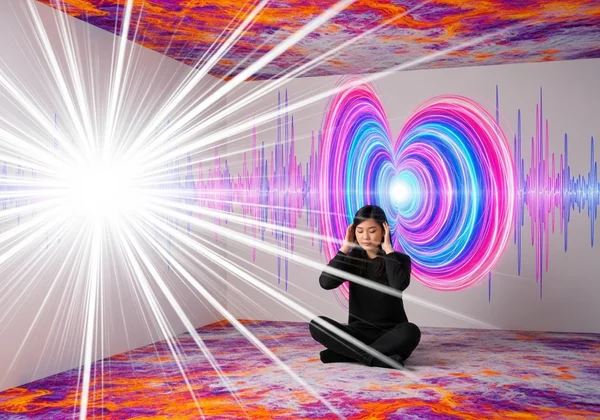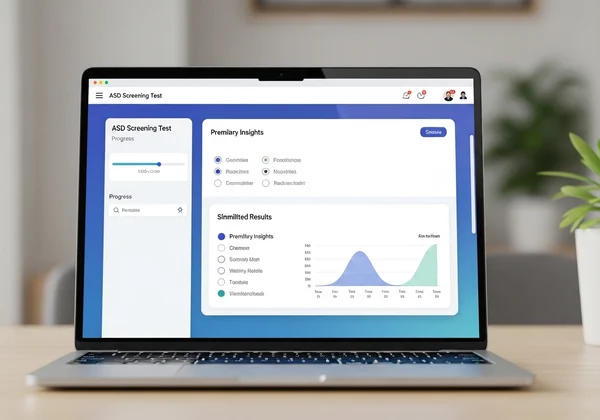Segni di Autismo negli Adulti: Autoconsapevolezza e Guida ai Test per la ASD
July 13, 2025 | By Eleanor Sutton
Ti sei mai sentito un po' "diverso", hai faticato con le sfumature sociali o hai trovato conforto in routine specifiche? Molti adulti si chiedono se i loro tratti unici possano allinearsi con il disturbo dello spettro autistico (ASD). Questa guida è per te: uno sguardo completo sulle caratteristiche comuni della ASD negli adulti, progettata per aiutarti a esplorare le tue esperienze e scoprire preziose intuizioni attraverso l'autovalutazione. Come posso testarmi per la ASD? Esploreremo come un test ASD online possa essere il tuo primo passo in un percorso di auto-comprensione, fornendo intuizioni preliminari sui tuoi schemi cognitivi e comportamentali unici.

Per molti adulti, certi schemi o sfide di lunga data potrebbero avere improvvisamente più senso se visti attraverso la lente dell'autismo. Questo articolo offre una guida compassionevole e informativa per aiutarti a esplorare questi sentimenti e trovare un punto di partenza per una comprensione più approfondita. Puoi sempre esplorare i tuoi tratti per iniziare la tua auto-scoperta.
Comprensione delle Comuni Caratteristiche della ASD negli Adulti
Il Disturbo dello Spettro Autistico è una differenza nello sviluppo neurologico che influenza il modo in cui gli individui percepiscono il mondo e interagiscono con gli altri. Sebbene spesso diagnosticato nell'infanzia, molti adulti scoprono i loro tratti della ASD più tardi nella vita, a volte dopo la diagnosi di un figlio o attraverso una maggiore consapevolezza della neurodiversità. Identificare questi tratti è un passo cruciale per l'auto-comprensione.
Differenze nella Comunicazione Sociale e nell'Interazione
Uno degli aspetti più distintivi dell'autismo riguarda la comunicazione sociale e l'interazione. Questo non significa una mancanza di desiderio di connessione, ma piuttosto un modo diverso di impegnarsi. Gli adulti autistici potrebbero trovare confuse le regole sociali non scritte, avere difficoltà nell'interpretare segnali non verbali come espressioni facciali o linguaggio del corpo, o trovare il "small talk" estenuante. Le conversazioni potrebbero sembrare un copione, o potrebbero dominare involontariamente discussioni su argomenti di intenso interesse. Il contatto visivo può essere scomodo, o può essere forzato consapevolmente, portando all'affaticamento. Comprendere queste differenze sociali uniche è fondamentale.
Interessi Ristretti e Comportamenti Ripetitivi
Gli individui autistici hanno spesso interessi ristretti profondamente coinvolgenti, a volte definiti "interessi speciali". Queste passioni possono spaziare da hobby di nicchia a specifici argomenti accademici, fornendo immensa gioia, conforto e un senso di padronanza. Sebbene questi interessi possano essere fonte di forza e talento, possono anche apparire intensi o totalizzanti agli altri. Parallelamente, comportamenti ripetitivi o routine (come lo "stimming", che può essere dondolarsi, sfarfallare le mani, o persino gesti sottili) possono servire come strumenti di autoregolazione, aiutando a gestire gli input sensoriali o a esprimere emozioni.

Sensibilità Sensoriali e Stili di Elaborazione
Molti adulti autistici sperimentano sensibilità sensoriali, il che significa che elaborano le informazioni sensoriali (come suoni, luci, texture o odori) in modo diverso. Questo può manifestarsi come una maggiore sensibilità a determinati stimoli (ad esempio, essere disturbati da rumori forti, tessuti specifici o odori intensi) o, meno comunemente, avere una ridotta sensibilità. Queste differenze possono influenzare significativamente la vita quotidiana, determinando gli ambienti scelti e i livelli di comfort in varie situazioni. Comprendere il proprio stile unico di elaborazione sensoriale è vitale per il benessere personale.

Funzioni Esecutive e Diversi Schemi di Pensiero
Le funzioni esecutive si riferiscono a un insieme di abilità cognitive che ci aiutano a pianificare, organizzare, dare priorità e gestire i compiti. Gli adulti autistici potrebbero sperimentare differenze in queste aree, portando a sfide nella gestione del tempo, nell'avvio di attività o nella transizione tra un'attività e l'altra. Questa non è una mancanza di intelligenza, ma piuttosto un approccio unico all'elaborazione delle informazioni. Gli schemi di pensiero autistici spesso implicano una forte preferenza per la logica, l'analisi orientata ai dettagli e un'interpretazione letterale del linguaggio. Questo può portare a eccezionali capacità di problem-solving ma anche a incomprensioni nella comunicazione.
Sono Autistico/a? Riflettendo sul Tuo Percorso
La domanda "Sono autistico/a?" è profonda per molti adulti in cerca di auto-comprensione. Questo percorso spesso implica il ripensare alle esperienze di vita attraverso una nuova lente, riconoscendo schemi che in precedenza mancavano di spiegazione. Si tratta di collegare i punti e trovare una narrazione che dia un senso al tuo modo unico di essere.
Esplorare le Esperienze dell'Infanzia e dell'Adolescenza
Mentre molti adulti ricevono una diagnosi di autismo più tardi nella vita, i tratti sono presenti fin dall'infanzia. Riflettere sulle esperienze infantili e adolescenziali può offrire indizi significativi. Hai avuto difficoltà a fare amicizia, preferito il gioco solitario o avuto interessi intensi e focalizzati? Eri spesso incompreso dai compagni o dagli insegnanti? Certi suoni o texture ti sopraffacevano? Questi indicatori precoci, anche se all'epoca trascurati, possono fornire un contesto prezioso per la tua attuale auto-percezione.
L'Impatto del Masking e del Camuffamento
Un aspetto significativo per molti adulti nello spettro è il masking (mascheramento) o il camouflaging (mimetizzazione). Ciò implica nascondere consapevolmente o inconsciamente i tratti autistici per adattarsi alla società neurotipica. Può manifestarsi come forzare il contatto visivo, imitare comportamenti sociali, creare copioni per le conversazioni o sopprimere gli stimming. Sebbene il masking possa aiutare a navigare le situazioni sociali, è incredibilmente estenuante e può portare a burnout, ansia e a una sensazione di disconnessione dal proprio sé autentico. Riconoscere l'impatto del camouflaging (mimetizzazione) è cruciale per l'auto-accettazione.

Oltre gli Stereotipi: Presentazioni Diverse dell'Autismo negli Adulti
L'autismo è uno spettro, il che significa che si presenta diversamente in ognuno. È importante guardare oltre gli stereotipi che spesso si concentrano su una presentazione ristretta, tipicamente maschile e con evidenti difficoltà sociali. Gli adulti autistici, incluse le donne e gli individui non binari, possono presentarsi in modo sottile, avendo sviluppato meccanismi di coping sofisticati. Le loro presentazioni diverse implicano che ciò che potresti aspettarti dalle rappresentazioni comuni dell'autismo potrebbe non corrispondere alla tua esperienza vissuta. Questa diversità significa che anche se non rientri in un'immagine tipica, i tuoi tratti potrebbero comunque allinearsi con lo spettro.
Come un Test ASD Online Può Guidare la Tua Auto-scoperta
Se ti riconosci in questi tratti, un test ASD online può essere un primo passo potenziante nella tua auto-scoperta. La nostra piattaforma fornisce una piattaforma di screening preliminare facile da usare e ricca di spunti, progettata per offrire chiarezza senza la pressione di una diagnosi formale. È uno spazio sicuro per esplorare le tue caratteristiche uniche.
Cosa Offre un Test di Screening Online per Adulti
Un test di screening online per adulti non è uno strumento diagnostico, ma serve come eccellente punto di partenza. Ti permette di esplorare i tuoi tratti in privato e al tuo ritmo. Per gli adulti, può aiutare a confermare i sospetti, fornire un vocabolario per esperienze precedentemente senza nome e dare una direzione più chiara per ulteriori ricerche o consulenze professionali, se desiderato. È un modo a bassa barriera per raccogliere intuizioni iniziali e decidere se i passi successivi sono adatti a te. È progettato per darti un'idea di dove potresti trovarti nello spettro in base a caratteristiche ampiamente riconosciute.
Il Tuo Primo Passo: Intuizioni Immediate
Questo autotest ASD offre un approccio conveniente, scientificamente informato e incentrato sulla privacy. Rispondi semplicemente a una serie di domande attentamente studiate basate sulle tue esperienze. Dopo il completamento, ricevi risultati preliminari immediati e un riepilogo di base. Per un'analisi più approfondita, puoi optare per il nostro esclusivo report di analisi personalizzato tramite IA. Questo report avanzato integra informazioni di background aggiuntive che fornisci, offrendo profonde intuizioni sui tuoi punti di forza, sfide, come i tratti influenzano la vita quotidiana e persino suggerimenti attuabili. È più di un semplice punteggio; è una guida personalizzata per comprendere il tuo neurotipo unico. Inizia oggi il tuo percorso e inizia il tuo test ASD approfondito.

Potenziare il Tuo Percorso di Auto-comprensione
Esplorare i segni di autismo negli adulti può essere un'esperienza trasformativa, che offre chiarezza e un percorso verso l'auto-accettazione. Riconoscere questi tratti è il primo passo verso la comprensione del tuo sistema operativo unico e di come puoi prosperare al meglio. Ricorda, questo viaggio riguarda la scoperta, non il deficit. Strumenti come il test ASD online per adulti disponibili qui sono progettati per potenziarti con la conoscenza.
Ti incoraggiamo a usare queste informazioni come trampolino di lancio per una comprensione più profonda. Sia che tu scelga di perseguire una diagnosi formale o di abbracciare l'auto-identificazione, acquisire intuizioni sui tuoi tratti può portare a una migliore auto-advocacy, relazioni migliorate e una vita più ricca e autentica. Fai il primo passo verso una migliore comprensione di te stesso. Inizia subito il tuo screening preliminare.
Domande Frequenti sullo Screening ASD negli Adulti
Come posso testarmi per la ASD?
Puoi testarti per la ASD facendo un test di screening online preliminare come quello offerto su questa piattaforma. Questi test presentano una serie di domande sulle tue esperienze e comportamenti, a cui rispondi in base alla tua auto-percezione. Questo fornisce intuizioni immediate e iniziali. Per una comprensione più approfondita, il nostro strumento di screening online offre un report di analisi personalizzato opzionale tramite IA. Basta visitare il nostro strumento di valutazione per iniziare.
Esiste un test ASD online affidabile?
Sebbene nessun test online possa fornire una diagnosi formale, esistono test di screening ASD online affidabili basati su principi consolidati che possono offrire preziose intuizioni preliminari. La nostra piattaforma fornisce una valutazione online scientificamente informata che funge da punto di partenza credibile per comprendere i tuoi tratti. Enfatizza la facilità d'uso e la privacy. Esplora le tue opzioni iniziando il tuo test ASD.
Qual è la differenza tra tratti ASD e goffaggine sociale?
La differenza tra tratti ASD e goffaggine sociale risiede spesso nella pervasività e nell'origine. La goffaggine sociale può essere situazionale o dovuta alla timidezza, mentre i tratti ASD sono differenze profondamente radicate nell'elaborazione neurologica che influenzano costantemente la comunicazione sociale, l'elaborazione sensoriale e gli schemi comportamentali in vari contesti e durante tutta la vita. Uno strumento di screening online può aiutarti a differenziare evidenziando i modelli tipici dei tratti ASD rispetto alle sfide sociali generali. Scopri di più facendo il tuo test ASD.
Un test di screening online può confermare se sono autistico/a?
No, un test di screening online, incluso il test ASD online sulla nostra piattaforma, non può confermare se sei autistico/a. Questi test sono strumenti preliminari progettati per l'auto-esplorazione e per fornire intuizioni iniziali sull'eventualità che le tue esperienze si allineino con le caratteristiche comunemente associate alla ASD. Una diagnosi formale può essere effettuata solo da un professionista sanitario qualificato, come uno psicologo o uno psichiatra, dopo una valutazione completa di persona. Usa il nostro strumento come prezioso punto di partenza facendo il tuo test ASD.